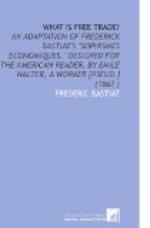But let us examine more closely this Sophism so accredited among our legislators; although, strange to say, it is precisely those who keep up the unproductive taxes (according to our present hypothesis) who attribute to them afterwards our supposed inferiority, and seek to re-establish the equilibrium by further taxes and new clogs.
It appears to me to be evident that protection, without any change in its nature and effects, might have taken the form of a direct tax, raised by the State, and distributed as a premium to privileged industry.
Let us admit that foreign iron could be sold in our market at $16, but not lower; and American iron at not lower than $24.
In this hypothesis there are two ways in which the State can secure the national market to the home producer.
The first, is to put upon foreign iron a duty of $10. This, it is evident, would exclude it, because it could no longer be sold at less than $26; $16 for the indemnifying price, $10 for the tax; and at this price it must be driven from the market by American iron, which we have supposed to cost $24. In this case the buyer, the consumer, will have paid all the expenses of the protection given.
The second means would be to lay upon the public an Internal Revenue tax of $10, and to give it as a premium to the iron manufacturer. The effect would in either case be equally a protective measure. Foreign iron would, according to both systems, be alike excluded; for our iron manufacturer could sell at $14, what, with the $10 premium, would thus bring him in $24. While the price of sale being $14, foreign iron could not obtain a market at $16.
In these two systems the principle is the same; the effect is the same. There is but this single difference; in the first case the expense of protection is paid by a part, in the second by the whole of the community. I frankly confess my preference for the second system, which I regard as more just, more economical, and more legal. More just, because, if society wishes to give bounties to some of its members, the whole community ought to contribute; more economical, because it would banish many difficulties, and save the expenses of collection; more legal, because the public would see clearly into the operation, and know what was required of it.
But if the protective system had taken this form, would it not have been laughable enough to hear it said: “We pay heavy taxes for the army, the navy, the judiciary, the public works, the debt, &c. These amount to more than 200 millions. It would therefore be desirable that the State should take another 200 millions to relieve the poor iron manufacturers.”
This, it must certainly be perceived, by an attentive investigation, is the result of the Sophism in question. In vain, gentlemen, are all your efforts; you cannot give money to one without taking it from another. If you are absolutely determined to exhaust the funds of the taxable community, well; but, at least, do not mock them; do not tell them, “We take from you again, in order to compensate you for what we have already taken.”




